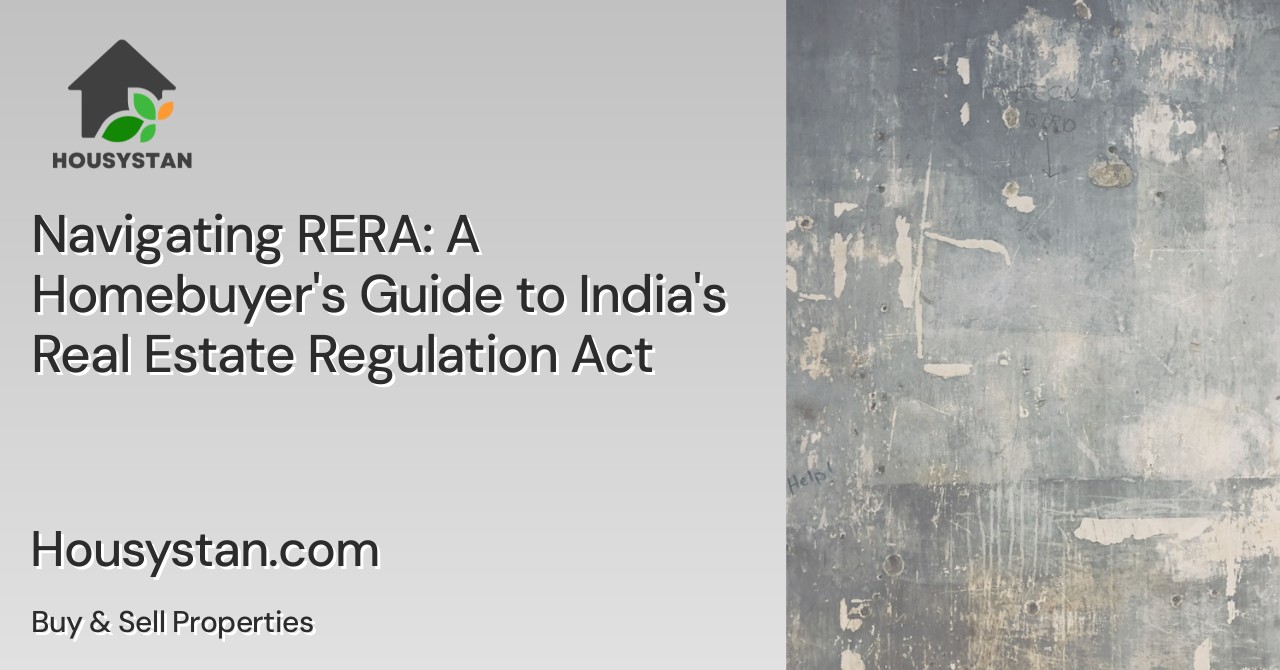Navigating RERA: A Homebuyer's Guide to India's Real Estate Regulation Act
Read latest blogs and articles from Housystan

The Information mentioned here was last updated on:
21/2/2026Navigating RERA: A Homebuyer's Guide to India's Real Estate Regulation Act
Introduction: Unveiling RERA's Role in Indian Real Estate
The Indian real estate sector has long been a labyrinth for homebuyers, fraught with delays, lack of transparency, and unpredictable project outcomes. In 2016, the government introduced the Real Estate (Regulation and Development) Act (RERA) to reshape the landscape for both buyers and developers. This landmark legislation aims to foster accountability, transparency, and fairness in real estate transactions. But what does RERA mean for the average homebuyer, and how can one leverage its provisions to ensure a secure property purchase? This guide delves into RERA’s framework, highlighting its significance, key features, and how it empowers Indian homebuyers.
- Verified Tenants/Buyers
- Unlimited Property Listing
- Zero subscription/charges fee
Understanding the Real Estate Regulation Act (RERA)
RERA was enacted with the core objective of protecting homebuyers and boosting investments in the real estate sector. The Act mandates the registration of real estate projects and agents, streamlines project disclosures, and establishes central and state authorities for grievance redressal. By imposing strict compliance requirements and penalizing errant builders, RERA marks a pivotal shift from the earlier unregulated regime.
Key Objectives and Provisions of RERA
At its heart, RERA is designed to instill confidence in property buyers. The Act’s primary objectives include promoting transparency, ensuring timely delivery of projects, curbing malpractices, and providing a robust mechanism for dispute resolution. It lays down clear rules for builders, such as mandatory registration of all commercial and residential projects above a certain size, full disclosure of project details, and restrictions on fund diversion.
How RERA Benefits Homebuyers
For homebuyers, RERA brings a host of tangible benefits. Firstly, it mandates that builders register their projects before advertising or selling, ensuring that only authorized developments reach the market. RERA also requires developers to deposit 70% of project funds in a dedicated escrow account, minimizing financial mismanagement. Homebuyers can now access detailed project information online, including layout plans, approvals, and completion timelines. In case of delays or discrepancies, buyers are entitled to compensation and can approach state RERA authorities for speedy resolution.
The Registration Process: What Buyers Should Know
Before making a purchase, homebuyers should verify whether the property is RERA-registered. Each project is assigned a unique registration number, which can be cross-checked on the respective state RERA portal. The online database offers a wealth of information, from builder backgrounds to project statuses and any legal disputes. Investing in a RERA-approved property ensures that buyers are protected under the Act’s provisions in the event of delays, quality issues, or contractual violations.
Transparency and Disclosure: The RERA Mandate
One of RERA’s standout features is the mandate for comprehensive disclosure by developers. Builders must provide regular updates on construction progress, financials, approvals, and any changes to sanctioned plans. This transparency empowers buyers to make informed decisions and holds developers accountable for their promises. The days of opaque deals and misleading advertisements are now numbered, with RERA acting as a watchdog for the sector.
Grievance Redressal Under RERA: Speed and Efficiency
RERA establishes Real Estate Regulatory Authorities and Appellate Tribunals in every state, which serve as dedicated platforms for resolving buyer grievances. Unlike traditional courts, RERA authorities are mandated to resolve cases within 60 days, ensuring swift justice. Buyers can file complaints online, track their status, and even appeal decisions if unsatisfied. The presence of a specialized forum has notably reduced the incidence of prolonged legal battles in real estate matters.
Penalties and Safeguards: Protecting Buyer Interests
Developers found violating RERA regulations face significant penalties, including hefty fines, deregistration, and even imprisonment in extreme cases. The Act also stipulates that any delay in possession entitles buyers to compensation or a full refund with interest. These stringent measures serve as powerful deterrents against malpractices and reinforce the security of buyer investments.
The Role of RERA in Curbing Project Delays
Project delays have historically plagued Indian real estate, often leaving buyers in limbo. RERA addresses this by making developers legally bound to deliver projects within stipulated timelines. Any deviation invites penalties, and buyers are compensated proportionately. This provision has instilled a sense of urgency and discipline among builders, leading to improved project completion rates since the Act’s inception.
Impact on the Indian Real Estate Market
Since RERA’s implementation, the Indian real estate market has witnessed a marked shift towards professionalism and ethical practices. Unscrupulous developers have been weeded out, and genuine players are thriving under the new regime. For homebuyers, this means greater trust, reduced risks, and a seamless property buying experience. The Act has also attracted increased foreign investment, given its emphasis on compliance and consumer protection.
Challenges and Limitations of RERA
While RERA has been a game-changer, certain challenges persist. Not all states have implemented RERA with equal rigor, leading to disparities in enforcement. Smaller projects below the specified threshold remain outside its purview, and ongoing projects at the time of RERA’s enactment were only partially covered. Additionally, some buyers remain unaware of their rights under the Act, underscoring the need for greater awareness and outreach.
Tips for Homebuyers: Making the Most of RERA
To fully leverage RERA’s protections, homebuyers should:
Conclusion: RERA as a Homebuyer’s Ally
The Real Estate Regulation Act stands as a cornerstone of buyer protection in India’s real estate sector. By fostering transparency, accountability, and timely delivery, RERA has redefined the homebuying journey. While challenges remain, the Act’s robust framework offers homebuyers a safer and more predictable path to property ownership. As awareness grows and enforcement strengthens, RERA promises to be the guiding light for millions seeking their dream home in India’s dynamic realty market.